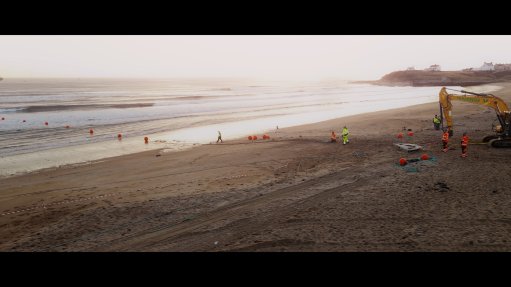White Paper on National Rail Policy released
The release of the White Paper on National Rail Policy represents a new epoch and a decisive break with the past, which saw the railways being used as an instrument to segregate society and give credence to a system of racial oppression, Transport Minister Fikile Mbalula said on May 9.
On March 23, Cabinet approved the White Paper on National Rail Policy, which Mbalula says takes a holistic view of the trajectory of the development of the country’s rail system.
“This policy not only creates policy certainty but also introduces radical structural reforms in the sector. This is intended to open up space for private sector investment and effective economic regulation that enables equitable access to both the primary and secondary network,” he emphasised.
Despite being entrenched in the country, Mbalula said railways have operated for more than a century without a cohesive National Rail Policy and challenges over time have weakened the efficiency of the system and limited its contribution to economic growth and connecting communities.
He cited the De Villiers report of 1986 that advocated against new rail investments, and deregulation of the road sector in 1988, saying these have pushed large portions of the rail industry into acute decline.
Moreover, this gave rise to deferred maintenance of passenger rail assets resulting in the subsequent decline of commuter rail over the decades, Mbalula said, noting that Metrorail’s decline is a direct consequence of these deliberate policy choices.
“The obsolete state of much of the rail infrastructure and rolling stock, the limitations of narrow gauge and the under-utilisation of the existing network presents only a few of the many challenges facing the rail sector,” he outlined.
The National Rail Policy sets out government's remedial interventions to achieve a rail renaissance in the country, which positions rail to contribute meaningfully to the country’s economy and reduction in the country's harmful greenhouse-gas emissions.
The key thrust of the White Paper on National Rail Policy is enabling investment in the country’s railways, with specific attention to the exploitation of rail's genetic technologies to achieve a renaissance in the market spaces of heavy haul, heavy intermodal, contemporary urban and regional rapid transit, Mbalula outlined.
He said the White Paper introduces secondary interventions that will give effect to institutional repositioning and allow for on-rail competition.
“This will open up the rail market to other operators to compete and improve operational efficiency that is needed to improve service quality and competitive pricing in the freight sector,” he posited.
Mbalula said these interventions would also reposition both passenger and freight rail to achieve inherent competitiveness by exploiting rail’s technologies to increase axle load as well as speed and train length across the board.
The policy further places emphasis on improved rural access, increased mobility and increased job creation within the rail sector through infrastructure construction and contributing to economic development.
Support to the agricultural, agroprocessing and mining sectors will receive maximum traction with the implementation of the policy, Mbalula stated.
The policy seeks to address the capacity challenges of passenger rail, where operator the Passenger Rail Agency of South Africa cannot run services and introduces concessioning on other lines where the private sector can operate services.
The White Paper presents a multi-decade vision of how South Africa’s railway sector should evolve over time, which Mbalula said would provide policy certainty and enable investment and private sector participation in the sector.
He pointed out that municipalities do not have the capacity to plan and operate railways in the requisite manner.
The White Paper acknowledges the importance of devolving public transport functions to the lowest level of government.
To this end, the National Rail Policy requires the development and approval of a Devolution Strategy for Commuter Rail to guide the assignment of the commuter rail function to the municipal sphere of government.
A devolution Strategy aligned with the Integrated Urban Development Framework will be a key feature of the next iteration of the National Land Transport Strategic Framework to take effect in 2023, said Mbalula.
The National Land Transport Act of 2009 provides for service level planning by municipalities for passenger rail service on a corridor basis.
Mbalula said that the department will work on a framework with the South African Local Government Association to guide efforts by municipalities to build requisite capacity that will enable the assignment based on the capacity of cities to manage the rail function within the broader ambit of its Integrated Public Transport Plan.
The White Paper goes further to introduce concessioning of passenger lines to enable the private sector to invest and unlock economic value of the railways.
The policy alludes that strategic rail network planning and oversight is a centralised strategic function that the Department of Transport will undertake.
A National Rail Master Plan anchored on the National Transport Master Plan 2050 will be developed, setting out a sustainable approach to strategic rail network planning and a long-term plan that informs all future developments of rail in the country, explained Mbalula.
The Railway Safety Regulator will be encouraged to leverage the considerable new investments to implement modern safety technologies.
To mitigate theft and vandalism, Mbalula indicated that there must be banning of export of scrap metal.
Mbalula emphasised that the key policy position from the paper on the introduction of third-party access on the rail network is one of the key thrusts to drive efficiencies and improve competitiveness.
He added that the National Rail Policy will guide the building of the local industry capacity, with government to ensure that industrialisation and the local production of steel and other inputs, rail lines and supplies, and rolling stock, are promoted.
With regard the role of private sector participation in railways, the Department will spearhead the development of a Private Sector Participation Framework for the rail Industry, Mbalula said.
This framework will aim to guide the collaboration between the major State-owned companies and private sector companies to deliver new economic infrastructure projects to augment the current level on infrastructure projects.
“The pursuit of private sector participation should, however, not be construed as the privatisation of the South African Railways, as there is no such policy on the table,” emphasised Mbalula.
He indicated that central to the passenger rail reforms is the introduction of high speed rail into the service mix. The Department will develop a High Speed Rail Framework to provide the foundation for the prioritisation of high speed railways in the country.
The implementation of the Policy will be segmented along short, medium and long-term reforms.
Article Enquiry
Email Article
Save Article
Feedback
To advertise email advertising@creamermedia.co.za or click here
Comments
Press Office
Announcements
What's On
Subscribe to improve your user experience...
Option 1 (equivalent of R125 a month):
Receive a weekly copy of Creamer Media's Engineering News & Mining Weekly magazine
(print copy for those in South Africa and e-magazine for those outside of South Africa)
Receive daily email newsletters
Access to full search results
Access archive of magazine back copies
Access to Projects in Progress
Access to ONE Research Report of your choice in PDF format
Option 2 (equivalent of R375 a month):
All benefits from Option 1
PLUS
Access to Creamer Media's Research Channel Africa for ALL Research Reports, in PDF format, on various industrial and mining sectors
including Electricity; Water; Energy Transition; Hydrogen; Roads, Rail and Ports; Coal; Gold; Platinum; Battery Metals; etc.
Already a subscriber?
Forgotten your password?
Receive weekly copy of Creamer Media's Engineering News & Mining Weekly magazine (print copy for those in South Africa and e-magazine for those outside of South Africa)
➕
Recieve daily email newsletters
➕
Access to full search results
➕
Access archive of magazine back copies
➕
Access to Projects in Progress
➕
Access to ONE Research Report of your choice in PDF format
RESEARCH CHANNEL AFRICA
R4500 (equivalent of R375 a month)
SUBSCRIBEAll benefits from Option 1
➕
Access to Creamer Media's Research Channel Africa for ALL Research Reports on various industrial and mining sectors, in PDF format, including on:
Electricity
➕
Water
➕
Energy Transition
➕
Hydrogen
➕
Roads, Rail and Ports
➕
Coal
➕
Gold
➕
Platinum
➕
Battery Metals
➕
etc.
Receive all benefits from Option 1 or Option 2 delivered to numerous people at your company
➕
Multiple User names and Passwords for simultaneous log-ins
➕
Intranet integration access to all in your organisation


















